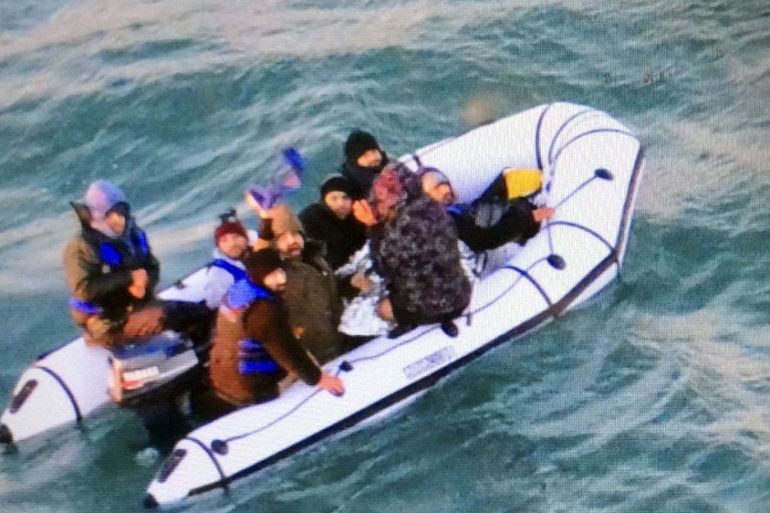‘Inhumane’: UK plan for tougher asylum system draws criticism
The government is attempting crack down on people who arrive by unauthorised routes, such as in small boats or in trucks.

The United Kingdom is planning to toughen immigration rules to make it harder for people who arrive by unauthorised routes, such as truck stowaways or those who board small boats, to be given asylum.
Home Secretary Priti Patel said asylum-seekers who come to Britain through organised, sponsored routes, will have their refugee claims considered promptly and will be given support to settle.
Keep reading
list of 4 items‘I wish I would die’: Syrians tortured in Lebanon, report says
From labour camp to councillor? North Korean refugee eyes UK vote
Kenya orders closure of Dadaab, Kakuma refugee camps
Those who enter the country otherwise will only be given temporary permission to stay, will receive limited benefits and will be “regularly reassessed for removal from the UK.”
Patel said the system would be “fair but firm.”
“People are dying at sea, in lorries and in shipping containers,” she said. “To stop the deaths we must stop the trade in people that cause them.”
Refugee groups and immigration lawyers say the plan unfairly discriminates against refugees based on the way they got to the UK.
“The proposals effectively create an unfair two-tiered system, whereby someone’s case and the support they receive is judged on how they entered the country and not on their need for protection,” said Mike Adamson, chief executive of the British Red Cross. “This is inhumane.”
But Patel said the changes are needed to stop illegal people-smuggling rings and will make the system fairer because it won’t give an advantage to those who can pay for their passage.
“What is inhumane is allowing people to be smuggled through illegal migration, and that is what we want to stop,” she told the BBC. “We will create safe and legal routes to enable people to come to the United Kingdom in a safe way.”
Refugees and migrants have for years used northern France as a launching point to reach the UK, either by stowing away in trucks or on ferries or in small boats organised by people smugglers.
In 2020, about 8,500 people arrived in Britain by crossing the Channel in small boats, and several died trying to make the journey.
Others have died while being smuggled by truck, including 39 Vietnamese migrants found dead in a refrigerated container in 2019 in the English town of Grays, east of London.
The UK and French governments have worked to stop the people-smuggling journeys, without much success.
The new UK measures – which have not yet been made into legislation and approved by Parliament – also include longer sentences for people-smugglers and tougher checks to catch adults claiming to be children.
The government also promised to speed up asylum decisions and quickly remove those who fail – promises British governments have made and failed to keep for years.
Critics of the government say bureaucratic backlogs left many asylum-seekers waiting years for decisions on their status. The coronavirus pandemic has bogged down the system even further.
The UK government says 35,099 people made asylum applications in the UK in the year to March 2020. That’s about a third of the number of applicants in Germany and less than half the total for Spain and France.
The UK’s position is also complicated by Brexit.
Since leaving the European Union, the UK no longer has a deal with its European neighbours to return people who have travelled across the Channel.
Marley Morris, an analyst with IPPR who heads the think tank’s work on migration, said the government’s proposal may break international law.
“In particular Article 31 of the 1951 Refugee Convention,” he said, “which states that parties ‘shall not impose penalties’ on refugees on account of their illegal entry or presence, provided they have good cause and present themselves to the authorities without delay.
“We should be more ambitious and look towards alternative safe and legal routes for asylum, in order to stop the channel crossings and save lives.
“In particular, humanitarian visas could provide a safe way for people to enter the UK to claim asylum, reducing the need for people to make dangerous journeys across the Channel.”